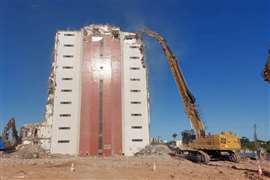Inside Brazil’s demolition sector: market shifts, challenges, and future prospects
20 February 2025
Economic uncertainty, regulatory gaps, and shifting industry demands are reshaping Brazil’s demolition sector. Fábio Bruno Pinto shares how his company is navigating these challenges while preparing for future opportunities.
 (PHOTO: Adobe Stock/marchello74)
(PHOTO: Adobe Stock/marchello74)
Fábio Bruno Construções is no stranger to large-scale demolition. The Brazil-based contractor has built a reputation for tackling complex and high-risk projects, and its latest undertaking is no exception.
Comprising a total footprint of 800,000 sq, with 8,000 structures set for demolition—including 23 buildings exceeding seven storeys—it is a major undertaking for Fábio Bruno Construções.
Yet, as Managing Director Fábio Bruno Pinto explains, the scale of demolition in Brazil is not the only factor shaping the industry. From economic fluctuations to regulatory gaps and an evolving demand for sustainability, the country presents both opportunities and challenges.
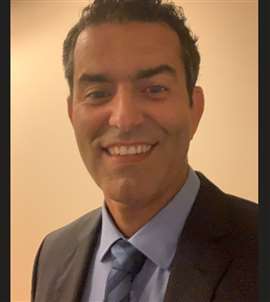 Fabio Bruno Pinto, Managing Director of Fábio Bruno Construções.
Fabio Bruno Pinto, Managing Director of Fábio Bruno Construções.
Mega Projects and New Technologies
“Brazil has seen financial volatility of late and although some markets are growing, here at Fabio Bruno we understand that demolition is the first level of sentiment in the economy, and we can see the early signs of a slowing economy.
“When the demolition market slows, we understand that less investment is being made. When the market starts to heat up, the first service to be performed is demolition,” says Pinto.
For Fábio Bruno Construções, this has meant investing in new technologies and equipment to meet the growing demand for high-reach demolition.
The company recently acquired the first ultra-high reach excavator in Brazil, capable of reaching 54 metres. “When we take on a high-risk project involving tall buildings in urban areas, safety is the priority,” says Pinto.
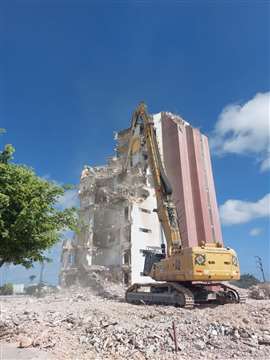 Fábio Bruno Construções’ new CAT 395 UHR at work on the Maceio/Alagoas Project in Brazil. (PHOTO: Fábio Bruno Construções)
Fábio Bruno Construções’ new CAT 395 UHR at work on the Maceio/Alagoas Project in Brazil. (PHOTO: Fábio Bruno Construções)
The company works with engineering partner ASI (Applied Science International) in the United States to simulate demolitions in advance, considering factors such as structure type, age, height, surrounding environment, and even expected weather conditions.
This emphasis on planning ensures maximum control over the demolition process, reducing the risk of accidents.
“Once the structure is down, a natural part of the process will have some of the material fragmented and spread within the demolition area itself. Hydroseeding is carried out on top of this material, this is a common practice to reduce dust and lower the risk of erosion in these exposed areas.
“For projects where there are more robust structures, such as buildings, the demolished material is fragmented and then transported to a crushing plant located approximately 20 km from the demolition area. This recycling of the concrete creates new aggregate and clean fill and is better for the environment,” Pinto adds.
Concrete from demolished structures is transported to a nearby crushing plant for recycling into new aggregate and clean fill. Hydroseeding is used on fragmented materials left on site to minimise dust and erosion, a common practice to control environmental impact.
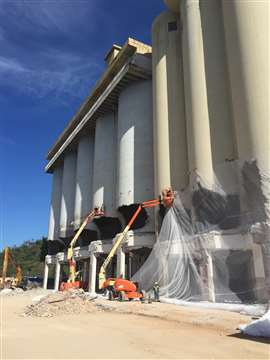 In 2015, the Brazilian contractor imploded 19 silos, all of them connect to each other, at the AB InBev distillery in Rio de Janeiro, as part of its complete demolition and recycling of the entire facility. (PHOTO: Fábio Bruno Construções)
In 2015, the Brazilian contractor imploded 19 silos, all of them connect to each other, at the AB InBev distillery in Rio de Janeiro, as part of its complete demolition and recycling of the entire facility. (PHOTO: Fábio Bruno Construções)
Economic Volatility and Market Challenges
Despite significant projects underway, the Brazilian demolition sector is not without its challenges.
“When demolition slows, it signals that investment is slowing,” he explains. “But on the other hand, when companies leave Brazil due to financial uncertainty, there is a growing demand for decommissioning, decontamination, and demolition services.”
This trend has created opportunities for Fábio Bruno Construções, which specialises in industrial decommissioning. However, competition remains fierce. While the company prides itself on technical expertise, safety, and quality, not all clients prioritise these factors when awarding contracts.
“Fábio Bruno is a company that always works with a high level of quality and excellent customer service. In private projects, we have the advantage of being more technically qualified than our competitors. This greater qualification has an associated cost that may not be accepted by the immediate client.
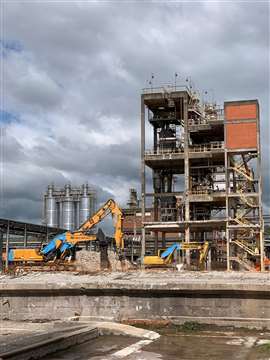 Fábio Bruno Construções’ 2019 work at the Braskem Plant in Triunfo, Brazil, comprised the demolition of plant structures, pipe racks, steel tanks and saw the implosion of the pictured facility, which was carried out while other parts of the plant were still in operation. (PHOTO: Fábio Bruno Construções)
Fábio Bruno Construções’ 2019 work at the Braskem Plant in Triunfo, Brazil, comprised the demolition of plant structures, pipe racks, steel tanks and saw the implosion of the pictured facility, which was carried out while other parts of the plant were still in operation. (PHOTO: Fábio Bruno Construções)
“However, when we can demonstrate the benefits and gains that the client will receive by performing the service with greater quality and safety, we certainly win the job. Public agencies are unable to perform this analysis, therefore it is very difficult to compete for public works.
“Fábio Bruno will not compromise on safety and quality and we will not cut corners to lower a price to win a job. We would never perform a service without complying with all current regulations, even if this means our price is not winning the work,” Pinto explains. Unlike some competitors, the company refuses to cut corners or compromise on safety standards to lower costs.
Regulatory Gaps and Industry Oversight
While Brazil has strict demolition regulations, enforcement remains inconsistent.
“The rules are there, but there aren’t enough inspectors to supervise compliance,” Pinto notes. He believes that better enforcement would push the industry forward by ensuring all contractors meet the same safety and quality standards.
Until then, companies like Fábio Bruno Construções will continue to compete in a market where not all players operate at the same level.
Sustainability and Future Trends
While the push towards Net Zero is driving change in Europe, Pinto says that sustainability is still a secondary concern for most Brazilian clients.
“Multinational companies have environmental targets, but very few national companies are truly concerned about greenhouse gas emissions,” he observes.
“Since we have to meet the demands of our contractors, this concern is often not taken into account,” Pinto says. Pinto believes that as international sustainability trends influence the region, demand for more environmentally conscious demolition solutions will grow.
Looking Ahead
Despite economic uncertainty and regulatory challenges, Pinto remains optimistic about the future of the Brazilian demolition industry. The company is already in discussions with multinational clients regarding plant decommissioning in Brazil and neighbouring countries and sees high-reach demolition as a growth area.
“We need leaders in their countries to demonstrate genuine concern for safety and quality of services, without this, it is very difficult to achieve a good project.
“As I have previously mentioned, quality and safety will always come first. While currently this leadership is not in place, we have been in discussions with multinational companies that need to remove their plants in four different countries. We hope to be able to start some of these projects as soon as possible,” Pinto says.
Expanding into the US
Fábio Bruno Construções is not only focused on the Brazilian market—it has also set its sights on North America. The company established a presence in the United States with offices in Florida and California, leveraging a strategic partnership with US-based general contractor Project Delivery Group LLC.
“We are confident in the expertise we bring to all forms of demolition; we know our worth and the potential of Fábio Bruno. We have the best equipment and the best people. It was time to expand and compete in a larger market,” says Pinto.
One key advantage the company sees in the US market is its cost structure. “With the value of our currency (Brazilian Real) being low compared to the US dollar, our administrative costs, management team salaries, and the value of our own equipment are also lower than the American market. This allows us to be quite competitive in terms of price,” Pinto explains.
The move into the US has presented both opportunities and challenges. While some regulatory and safety standards align with Brazilian practices, adapting to specific American requirements has been essential.
“American regulations are very similar to Brazilian ones, and of course, safety is a main priority for Fábio Bruno. It was important for the team in Brazil, and for me, to take the OSHA training certification,” says Pinto.
However, procedural differences, permitting processes, and client expectations require a tailored approach. Navigating these landscapes has been an important learning experience for the company as it establishes itself in the US market.
To gain a foothold, the company has been leveraging its expertise in complex demolitions, particularly in implosions and industrial decommissioning. Fábio Bruno Construções specialises in various demolition methods, including high-reach demolition, implosions, and hazardous material removal, which it aims to expand in the US market.
While the company has yet to secure a major US demolition contract, Pinto remains optimistic about future opportunities. “Our local USA partner is well connected in the construction industry. Although we do not have a specific project at the moment, we have advanced negotiations on some opportunities,” he says.
Looking ahead, the company plans to increase its presence in the US market, with a focus on mechanised demolitions and high-reach operations. “We understand that customers value a company operating in different countries. This demonstrates its management capacity, business organisation, and professional success,” Pinto concludes.
CONNECT WITH THE TEAM






